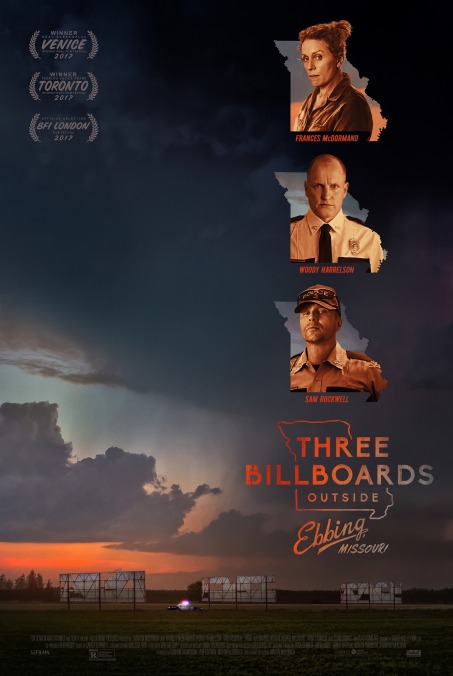The unpredictable Three Billboards Outside Ebbing, Missouri pits Frances McDormand against the world

On a lonely backstretch of road largely unused since the highway was built, a message appears in big black letters, spread across three bright red canvases. “Raped While Dying,” the first reads. “And Still No Arrests?” goes the second. And finally: “How Come, Chief Willoughby?” This is the doing of one Mildred Hayes (Frances McDormand), who’s put down $5,000 a month for the advertising space to send a message to the complacent local police force. It’s been seven months since the body of Mildred’s teenage daughter was discovered, lifeless and immolated, and as the signs indicate, there have been no breaks in the case. The billboards aren’t just a publicity stunt, designed to grease the wheels of justice. They’re a declaration of war.
Written and directed by Martin McDonagh, the Irish playwright who made In Bruges and Seven Psychopaths, Three Billboards Outside Ebbing, Missouri begins like a classic David-versus-Goliath story, pitting this bereaved, enraged mother against the whole damn world. Mildred, whose bottomless grief has hardened into a single-minded, nothing-left-to-lose crusade, bulldozes through anyone unwise enough to stand in her way: not just the cops who, in her words, are “too busy torturing black folks to solve actual crimes,” but also neighbors, asshole teenagers, and the town’s condescending Catholic priest, who she dresses down with a juicy, show-stopping monologue. Grimacing with granite conviction, her hair pulled back by a bandana that makes her look vaguely like a heartland samurai, McDormand is righteous fury personified, and her performance—the best she’s delivered since Fargo, maybe—is heartbreaking, but also wildly, profanely entertaining. You want to follow her into battle.
Yet Three Billboards isn’t as cut-and-dry as it first appears; it doesn’t take long to realize that McDonagh, savvy dramatist that he is, has set out to do more than rally his audience around an underdog. For starters, it’s revealed early on that Ebbing’s police department, while populated with its fair share of knuckleheads and racists, didn’t so much bungle the investigation as run into dead ends—there just wasn’t much evidence to go on. And the vilified Chief Willoughby, played with that familiar Southern twinkle and drawl by Woody Harrelson, turns out to be a decent man trying his best, sympathetic to his new enemy’s anger, and even to her uncompromising tactics. Oh, and he also happens to be dying of cancer—information that Mildred was privy to when she began accusatorially dragging his name through the mud. “They won’t be as effective after you croak,” she admits of the billboards, half-apologetically.
Has sorrow, guilt, and blinding rage pushed Mildred past the point of reason? In her tireless campaign, has she lost perspective, ignoring the reality of the situation and the protests of her surviving child, teenage Robbie (Lucas Hedges), a bystander of her feud? Three Billboards does more than muddy audience allegiance. It blows empathy in all directions, even toward characters who seem to exist as punchlines or villains. Look, for example, at Jason Dixon, the moron cop Sam Rockwell plays; he starts as the lumbering embodiment of police brutality and bigotry, only to suffer his own crisis of conscience and responsibility—a rather daring dramatic choice, akin to expressing sympathy for the head-cracking devil. McDonagh envisions small-town America as a simmering crockpot of personalities, where everybody knows everybody, and every dispute comes laced with shared history and kinship. Willoughby and Mildred, locked in tense conflict, are still a breath away from friendship; in one startling gear-shift moment, a shouting match between them ends in a ceasefire of unexpected compassion when he suddenly coughs up blood.
We’re a long way from McDonagh’s last film, Seven Psychopaths, which was a gleefully glib (albeit frequently hilarious) meta cartoon crime caper, like what Charlie Kaufman might make if assigned to write a Tarantino knockoff with his fictional brother Donald. Landing closer to Coens country, Three Billboards is more of a slow-roasting tragicomedy about grief and culpability, with higher stakes, a lower gag count, and emphasis on the tragic. But McDonagh still lives for detours and digressions, for the opportunity to stall the plot and humorously slow play a conversation. Every protracted tête-à-tête is a reminder of his theatrical background, and he’s so invested in his loquacious townsfolk—played by a murderers’ row that includes Peter Dinklage, Kerry Condon, Caleb Landry Jones, Abbie Cornish, John Hawkes, and Clarke Peters—that he seems ultimately content just pairing them off and knocking them together.
For better and worse, there’s really no predicting where Three Billboards is headed. McDonagh devises such a superb dramatic scenario—two people with a begrudging mutual respect, on opposite sides of an impossible situation, headed straight at each other like cars playing chicken—that it’s almost a disappointment when the film ends up subverting its own trajectory, then squiggling off in other directions. On the other hand, perhaps that zigging and zagging around expectations is all part of McDonagh’s big picture. By the boldly open-ended ending, when a quest for justice starts looking an awful lot like settling for indiscriminate payback, the lack of resolution takes on its own moral dimension. For Mildred, closure may be further out of reach. Why should it be any different for us?